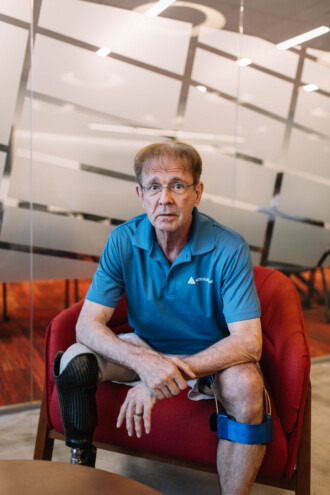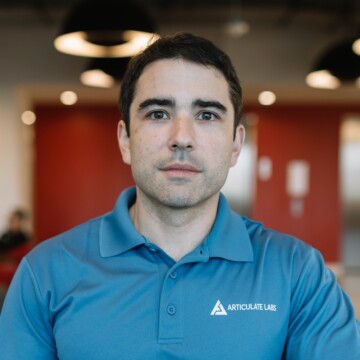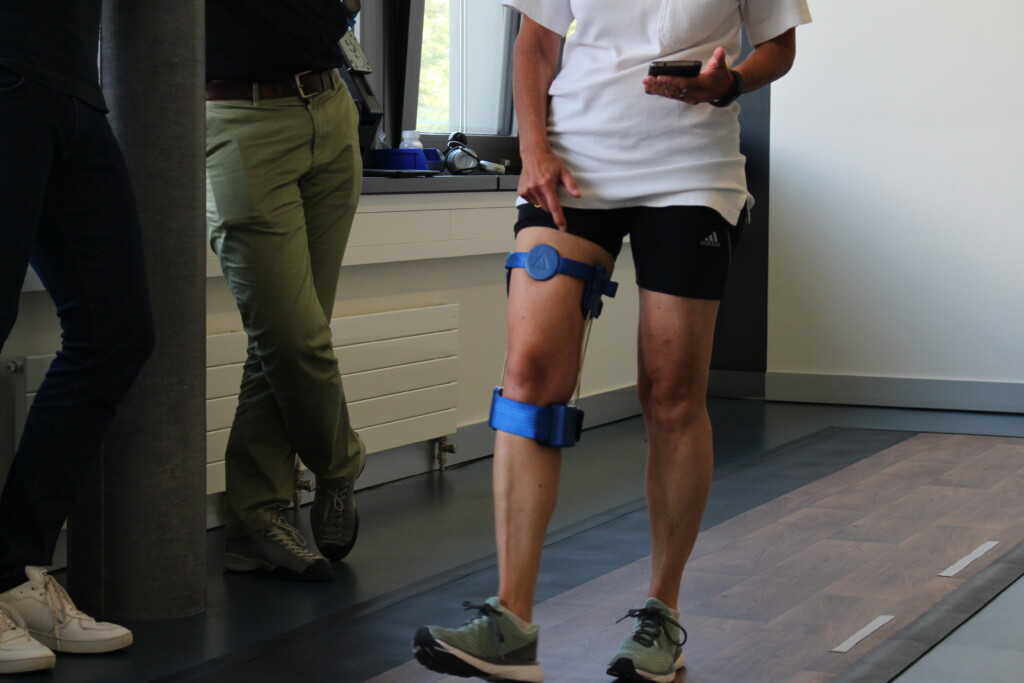What if you could rehab your knee while performing your regular daily routine? Dallas-based Articulate Labs is on a mission to allow patients to do just that with a wearable device that stimulates the knee with an electrical current throughout the day as part of the rehab process.
Articulate Labs co-founders Herbie Kim and Josh Rabinowitz have been working to develop the product since 2009 when the product was first developed by Herbie Kim when he developed osteoarthritis in his knee after losing part of his leg due to a motorcycle accident. He wore out the cartilage trying to relearn to walk and went to physical therapy to help rehabilitate his leg.

Knee osteoarthritis impacts 12 million people in the U.S., and 30 million people have evidence of damage. For many, the lack of time for strengthening is an issue.
Physical therapy was a 30-minute drive away, and while connected to the electric stimulation device, Kim thought, “Why am I following this device? Why isn’t this device following me?” So, the Articulate Labs chief science officer built a solution for his problem. With a background in control systems, design, and power trains, he developed the base technology that would grow into Articulate Labs’ product, KneeStim.
An attempt to commercialize the product in 2012 was put on hold to improve staffing and market awareness, but the recent growth in remote care has injected the company with a new sense of urgency. Articulate Labs recently won a $1.3 million award to study the use of their device to accelerate return to duty for active duty military soldiers recovering from ACL reconstruction, the company’s first full clinical trial. It will test to see if the device can improve return-to-duty time for 50 cadets recovering from surgery, half of which will get a fully functioning KneeStim.
Testing on 50 cadets recovering from reconstruction, half that group using fully functional KneeStim, other sham devices strengthen, mobility, metrics, looking at seeing if we can cut time in return to duty, in a state not likely to reinjure themselves,
Here is how it works: Patients who have had recent knee surgery or a chronic knee condition experience muscle atrophy but may have too much pain or insufficient strength to build back the muscle. Patients wear the KneeStim device on the knee. It provides neuromuscular electric stimulation when the patient moves, as the stimulation builds muscle and reduces pain more effectively for an active joint than a passive one.
The device can also track data about the movement, measuring stride length and other movement metrics as the patient goes throughout the day. Rabinowitz says early data shows the device doubles the strength in the knee post-operation compared to the standard of care.
The surgeon would prescribe the device to their patient where it would be rented out like other durable medical equipment, and patients can set the stimulation to a comfortable level, but the provider will determine which movements will receive the stimulation. “When those problematic movements are occurring, the device will look for and actively anticipate replication of those force vectors during usual movements,” Rabinowitz says.
Rabinowitz’s background is in operations and finance, and he worked with Kim to get Articulate into Health Wildcatters’ 2017 cohort, where the company learned about the clinical trial process and other gaps in their knowledge base they didn’t know existed. The company also participated in TechStars FW.
Currently, the company is fundraising and partnering with providers to gather pilot data about pain relief and gait metrics. They are working with Memorial Hermann and Houston Methodist in Houston, as well as UNTHSC and JPS Health Network in Fort Worth. The company is targeting knee replacement patients who want to recover quickly and reduce costs after an expensive treatment. KneeStim is hoping to do both.
Rabinowitz sees the device as an extension of these providers, not a replacement. “We want to help extend the physical therapist’s reach outside of the clinic and want to automate some of the more mindless work they do,” he says. “We are taking this therapy and providing it outside of the clinic, which frees up more one-on-one time for the therapist to work with the patient.”

Articulate Labs hopes to launch KneeStim in the second quarter of next year, though Rabinowitz is wary of making too many timeline predictions, given the nature of the industry. A clinical trial isn’t necessary for a device like this to receive FDA approval, but it will add data to the process. The company is working on FDA approval documentation about the device’s safety, the specs, expected outcomes, risks, and risk mitigation.
For Rabinowitz, it is all about taking advantage of idle time to speed up and improve recovery. “We’re looking to leverage user movement and body weight to stimulate the muscle as they are using it while shopping for groceries, walking their dog, or walking out to get the mail,” Rabinowitz says. “We are trying to take those everyday opportunities where that muscle is being used and turn those into strengthening and retraining repetitions. It addresses the time issue; it makes the therapy part of your everyday activity.”
Author







